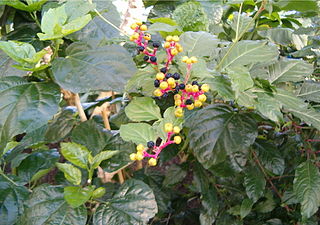
Gossypium is a genus of flowering plants in the tribe Gossypieae of the mallow family, Malvaceae, from which cotton is harvested. It is native to tropical and subtropical regions of the Old and New Worlds. There are about 50 Gossypium species, making it the largest genus in the tribe Gossypieae, and new species continue to be discovered. The name of the genus is derived from the Arabic word goz, which refers to a soft substance.

Berberis, commonly known as barberry, is a large genus of deciduous and evergreen shrubs from 1–5 m (3.3–16.4 ft) tall, found throughout temperate and subtropical regions of the world. Species diversity is greatest in South America and Asia; Europe, Africa and North America have native species as well. The best-known Berberis species is the European barberry, Berberis vulgaris, which is common in Europe, North Africa, the Middle East, and central Asia, and has been widely introduced in North America. Many of the species have spines on the shoots and all along the margins of the leaves.

The Berberidaceae are a family of 18 genera of flowering plants commonly called the barberry family. This family is in the order Ranunculales. The family contains about 700 known species, of which the majority are in the genus Berberis. The species include trees, shrubs and perennial herbaceous plants.

Abutilon pictum, syn. Abutilon striatum (disputed), is a species of flowering plant in the family Malvaceae. It is native to southern Brazil, Argentina, Paraguay and Uruguay. The plant has become naturalised in Central America, and is used in horticulture. Common names include redvein abutilon, red vein Indian mallow, redvein flowering maple, Chinese-lantern and red vein Chinese lanterns.

Darwin’s frog, also called the Southern Darwin's frog, is a species of Chilean/Argentinian frog of the family Rhinodermatidae. It was discovered by Charles Darwin during his voyage on HMS Beagle. on a trip to Chile. In 1841, French zoologist André Marie Constant Duméril and his assistant Gabriel Bibron described and named Darwin's frog. The diet of R. darwinii consists mostly of herbivore invertebrates. R. darwinii is currently classified as an endangered species by the International Union for Conservation of Nature.

Berberis darwinii, Darwin’s barberry, is a species of flowering plant in the family Berberidaceae, native to southern Chile and Argentina and naturalized elsewhere. Regional vernacular names include michay, calafate, and quelung. Growing to 3–4 m (9.8–13.1 ft) tall, it is an evergreen thorny shrub.

Andersonia is a subgenus of Stylidium that is characterized by a linear hypanthium, recurved mature capsule walls, an erect and persistent septum, and many seeds. This subgenus occurs in areas of tropical northern Australia and into Southeast Asia and was named in honour of William Anderson, the surgeon and naturalist who sailed with James Cook.

Lecocarpus darwinii is a species of flowering plant in the family Asteraceae. It is found only in Galápagos Islands, Ecuador.

Nothura is a genus of birds in the tinamou family. This genus comprises five members of this South American family.

Pleuropetalum darwinii is a species of plant in the family Amaranthaceae. It is native to the Galápagos Islands.

Pleuropetalum is a genus of flowering plants in the family Amaranthaceae.
Tiquilia darwinii is a species of plant in the family Boraginaceae. It is endemic to the Galápagos Islands of Ecuador.

Captain John Donnell Smith of Baltimore, Maryland was an American biologist and taxonomist. He was also an officer in the Confederate army.

Lomatium donnellii is a perennial herb of the family Apiaceae, in the Western United States.
P. darwinii may refer to:
L. darwinii may refer to:
C. darwinii may refer to:
Stylidium darwinii is a small, erect annual plant that belongs to the genus Stylidium. It grows up to 4.5 cm (1.8 in) tall. Elliptic-oblong or obovate to orbicular leaves are scattered and alternate along the simple, glabrous stem. The leaves are generally 2–3 mm long and 1.5-1.8 mm wide. Inflorescences produce many violet-pink flowers, which flower from September to November. Stylidium darwinii is only known from Anshi National Park in the Uttara Kannada district of Karnataka, India. Its habitat is recorded as being moist gravelly soils on the outskirts of evergreen forests near roadsides at an altitude of 530 m (1,739 ft). It can be found in association with several carnivorous plant species, including Drosera burmannii, Drosera indica, and Utricularia caerulea. The specific epithet darwinii was given to this species in honor of Charles Darwin.

Callianthe is a genus of flowering plants in the tribe Malveae. It is distributed throughout the Neotropics.
Neosparton is a genus of flowering plants belonging to the family Verbenaceae.











